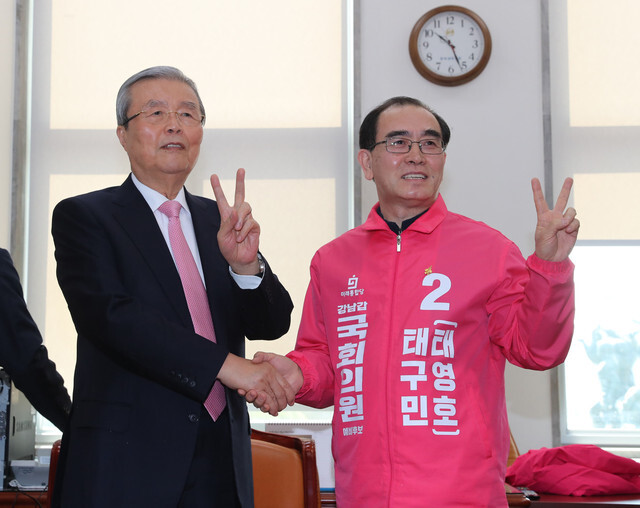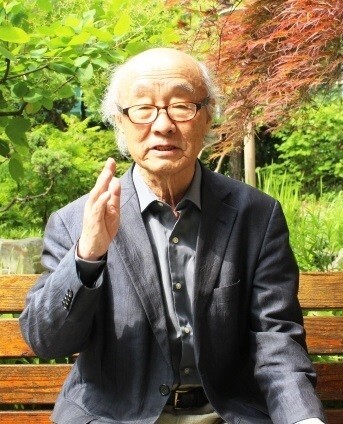hankyoreh
Links to other country sites 다른 나라 사이트 링크
[Column] The fallacy of regime change in N. Korea and distorted perceptions of defectors among S. Koreans and Americans

The air is electric as the parliamentary elections approach on Apr. 15. Since I’ve been studying political science for more than 50 years in the US, South Korea’s politics are always of interest to me. But this election carries unusual significance because I’ve detected a pattern that sets this election apart from previous ones: the political activity of North Korean defectors.
More than half of North Koreans who defect to South Korea reportedly live in a state of extreme poverty. Their hardship should be easy to deduce from their suicide rate, which is three times that of South Koreans — a remarkable fact, considering that South Korea has the highest suicide rate in the world. I’ve been told that one way for defectors to rise above their difficult circumstances is to appear on TV shows. But most of the stories they tell on TV demonize the North.
I’ve spent my life studying North Korea, a country that I’ve visited more than 50 times. But I’m often nonplussed by what defectors say on TV. So much of what they say just isn’t true. The same goes for the self-proclaimed North Korean experts among the defectors who expound on North Korean politics.
I do think highly of the efforts by YouTube channel Walgawalbuk to serve as a fact checker and a watchdog. Walgawalbuk recently reported the TV program “Now on My Way to Meet You” on Channel A and “Moranbong Club” on TV Chosun to the Korea Communications Standards Commission for repeatedly running misleading reports about North Korea.
A while ago, I paid a visit to the grave of Hwang Jang-yop, the highest-ranking North Korean to ever defect. Hwang was buried at the Daejeon National Cemetery upon his death in 2010. I couldn’t take my eyes off the inscription there, which read, “The grave of Hwang Jang-yop, chair of the Committee for the Democratization of North Korea.”
Over the course of more than eight years, I had numerous academic discussions with Hwang in the North. Over the many years we were in communication, it became clear to me that the concept of North Korea’s democratization had no place in his soul. If anything, Hwang had a strong antipathy for the American brand of democracy.
Hwang was named the chair of the Committee for the Democratization of North Korea because of a fantasy about regime change in North Korea. We continue to see defectors like Hwang attempting to organize politically with the goal of carrying out regime change in North Korea.
Thae Yong-ho (Thae Gu-min), the North Korean diplomat-turned-defector who is running for the National Assembly in the Gangnam A district in Seoul, announced his candidacy as follows: “If I’m elected as a lawmaker in this district, it will bring not only hope but also confidence to the North Korean elites who are playing a key role in maintaining the North Korean system and regime [. . .] as well as decent North Koreans who long for freedom. [. . .] Just as I’ve borne witness to the issues of North Korean human rights and North Korea’s nuclear program in South Korea, so will I bear witness to liberal democracy and representative democracy in North Korea.”
Furthermore, the Inter-Korean Unification Party, which was established by defectors, has promised to “set up underground cells in North Korea to bring down the regime of Kim Jong-un.” For those who respond emotionally to the demonization of North Korea, the appeals of Thae Yong-ho and the Inter-Korean Unification Party must sound like gospel truth.
In order for any political system to collapse, that system must confront a crisis of legitimacy in which the people being ruled revoke their psychological support for the system. But the fact that the North Korean regime has remained in place for more than 70 years clearly shows that it has never suffered such a crisis of legitimacy.
Even if one or two defectors are elected to South Korea’s National Assembly, I doubt it will shake up the North Korean masses or elites. And setting up underground cells in the North to topple the regime doesn’t sound like a feasible plan. North Korea isn’t governed by party politics, after all. The Workers’ Party of Korea isn’t even a political party — it’s the country’s supreme decision-making body.
In light of those facts, why are some defectors rushing into politics? This can only be explained by the support and expectations of South Korea and Americans who buy into the fantasy of regime change in North Korea. According to documents published by WikiLeaks, South Korea’s National Intelligence Service gave the US 9,180 defector-related records produced between 1997 and 2007. The US has also never stopped funding defector organizations with the hope of gleaning intelligence about what’s going on inside North Korea.

The US is thoroughly brainwashing the South Korean public about its policy of North Korean regime change and constantly scheming to engineer the overthrow of the North Korean government through global propaganda that presents the North as part of an “axis of evil.” But the strategy of using defectors as tools to achieve regime change will do nothing but further entrench the division of the Korean Peninsula. That division must be rigorously sustained if the US is to continue selling its weapons for an astronomical price. Koreans must never forget that they and their descendants are the ones who must pay that price.
By Park Han-sik, professor emeritus at the University of Georgia

Editorial・opinion
![[Column] Season 2 of special prosecutor probe may be coming to Korea soon [Column] Season 2 of special prosecutor probe may be coming to Korea soon](https://flexible.img.hani.co.kr/flexible/normal/500/300/imgdb/original/2024/0426/3317141030699447.jpg) [Column] Season 2 of special prosecutor probe may be coming to Korea soon
[Column] Season 2 of special prosecutor probe may be coming to Korea soon![[Column] Park Geun-hye déjà vu in Yoon Suk-yeol [Column] Park Geun-hye déjà vu in Yoon Suk-yeol](https://flexible.img.hani.co.kr/flexible/normal/500/300/imgdb/original/2024/0424/651713945113788.jpg) [Column] Park Geun-hye déjà vu in Yoon Suk-yeol
[Column] Park Geun-hye déjà vu in Yoon Suk-yeol- [Editorial] New weight of N. Korea’s nuclear threats makes dialogue all the more urgent
- [Guest essay] The real reason Korea’s new right wants to dub Rhee a founding father
- [Column] ‘Choson’: Is it time we start referring to N. Korea in its own terms?
- [Editorial] Japan’s rewriting of history with Korea has gone too far
- [Column] The president’s questionable capacity for dialogue
- [Column] Are chaebol firms just pizza pies for families to divvy up as they please?
- [Column] Has Korea, too, crossed the Rubicon on China?
- [Correspondent’s column] In Japan’s alliance with US, echoes of its past alliances with UK
Most viewed articles
- 1‘We must say no’: Seoul defense chief on Korean, USFK involvement in hypothetical Taiwan crisis
- 2Why Kim Jong-un is scrapping the term ‘Day of the Sun’ and toning down fanfare for predecessors
- 3After election rout, Yoon’s left with 3 choices for dealing with the opposition
- 4Two factors that’ll decide if Korea’s economy keeps on its upward trend
- 5BTS says it wants to continue to “speak out against anti-Asian hate”
- 6Gangnam murderer says he killed “because women have always ignored me”
- 7South Korea officially an aged society just 17 years after becoming aging society
- 8[Column] Park Geun-hye déjà vu in Yoon Suk-yeol
- 9Division commander ordered troops to enter raging flood waters before Marine died, survivor says
- 10No good, very bad game for Korea puts it out of Olympics for first time since 1988